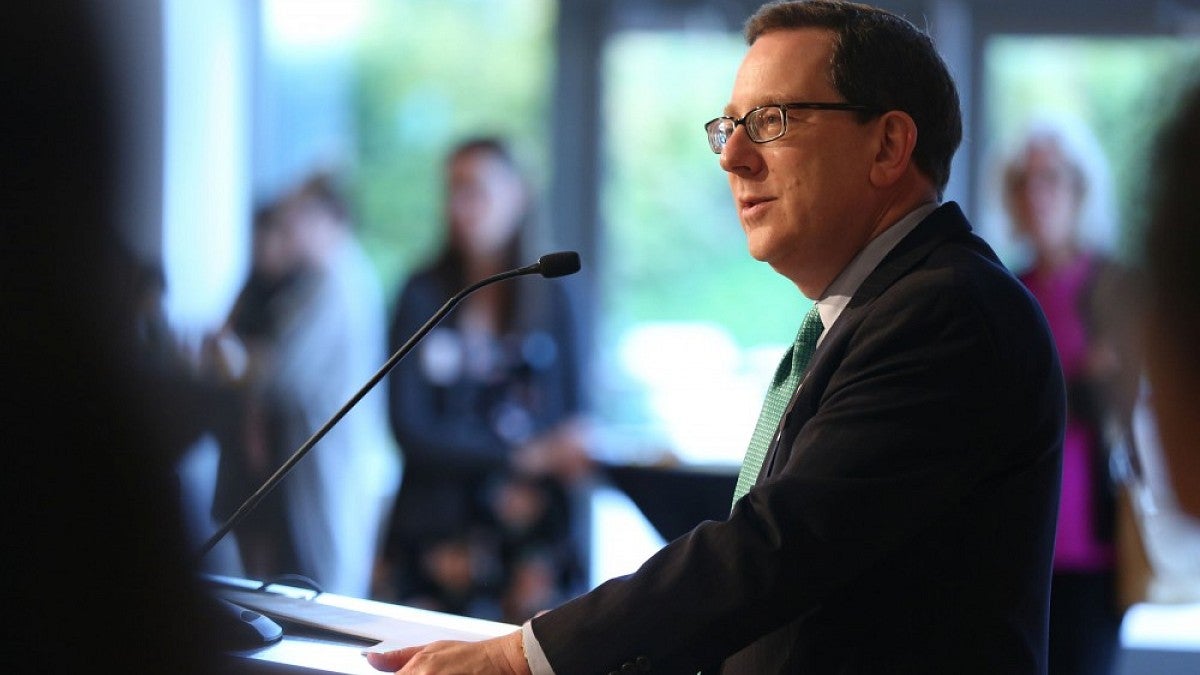The Phil and Penny Knight Campus for Accelerating Scientific Impact shows how an initiative supported by both private and public investment has the potential to shift the way state universities can remain competitive and drive the next wave of scientific research, UO President Michael H. Schill told participants in a Northwest economic summit.
Schill spoke Monday during a roundtable discussion with other regional university presidents and higher education officials at the 27th annual Pacific Northwest Economic Region Summit in Portland. He was joined by Ed Ray, president of Oregon State University; Wim Weiwel, president of Portland State University; Nagi Naganathan, president of the Oregon Institute of Technology; Thomas Insko, president of Eastern Oregon University, among others.
The summit, which began Monday, brings together legislators, corporate and industry leaders, nongovernmental organization directors, and federal representatives from the Pacific Northwest states and western Canada. Discussions center on opportunities for economic growth and major challenges to the economy, environment and sustainability. UO faculty and staff attended sessions on disaster resilience and renewable forest products.
This is the first time the summit has been held in Oregon in more than five years. New this year was the addition of the Oregon Coastal Caucus Economic Summit, which is usually held on the Oregon Coast and hosted by the coastal delegation to the Oregon Legislature. The gathering focuses on the strengths and opportunities of rural and coastal Oregon.
In the roundtable discussion, Schill focused on the Knight Campus, the opportunities for public-private partnerships in higher education, and regional innovation and collaboration among institutions and industry.
Taxpayer funding has traditionally been the foundation of the nation’s higher education system, but its viability has been challenged in recent years. States such as Oregon have struggled to invest in public universities at the level needed for student success and affordability.
Schill has called new investments in higher education the Legislature made over the last two bienniums a step in the right direction. However, he said it is not yet enough to be transformational. The Knight gift of $500 million to establish the campus demonstrates that even in this era of public retrenchment, a school such as the UO can emerge stronger and more competitive than ever, he said.
“Private-public investment like the Knight Campus will be a boost to all universities and the students and communities they serve,” Schill said Monday. “The Willamette Valley lies smack in the middle of the corridor that reaches from Silicon Valley to Seattle and on to Vancouver, B.C. The development of this research and innovation ecosystem will offer new collaborative opportunities with other universities including Oregon Health & Science University, PSU and OSU, as well as institutions in our neighboring states and Canada.”
Those aspirations are already bearing fruit, he said, as evidenced by the research summit between OHSU and the UO in April. That event brought together faculty and administrators from both institutions to discuss how their work and research can dovetail and the impacts are amplified generations into the future.
The economic summit continues through Wednesday of this week in Portland.


